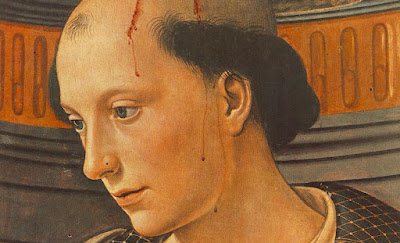Saint Stephen, Deacon and Martyr
[December 26.]
The Collect.
G |
RANT, O Lord, that, in all our sufferings here upon earth for the testimony of thy truth, we may stedfastly look up to heaven, and by faith behold the glory that shall be revealed; and, being filled with the Holy Ghost, may learn to love and bless our persecutors by the example of thy first Martyr Saint Stephen, who prayed for his murderers to thee, O blessed Jesus, who standest at the right hand of God to succour all those who suffer for thee. our only Mediator and Advocate. Amen.
The text serving as the Epistle for this morning comes from the Acts of the Apostles, the Seventh Chapter, beginning at the Fifty-Fifth Verse:
The Epistle.
(Acts vii. 55.)
S |
TEPHEN, being full of the Holy Ghost, looked up stedfastly into heaven, and saw the glory of God, and Jesus standing on the right hand of God, and said, Behold, I see the heavens opened, and the Son of man standing on the right hand of God. Then they cried out with a loud voice, and stopped their ears, and ran upon him with one accord, and cast him out of the city, and stoned him: and the witnesses laid down their clothes at a young man’s feet, whose name was Saul. And they stoned Stephen, calling upon God, and saying, Lord Jesus, receive my spirit. And he kneeled down, and cried with a loud voice, Lord, lay not this sin to their charge. And when he had said this, he fell asleep.
This morning’s Holy Gospel comes from the Gospel according to Saint Matthew, the Twenty-third Chapter, beginning at the Thirty-Fourth Verse:
B |
EHOLD, I send unto you prophets, and wise men, and scribes: and some of them ye shall kill and crucify; and some of them shall ye scourge in your synagogues, and persecute them from city to city: that upon you may come all the righteous blood shed upon the earth, from the blood of righteous Abel unto the blood of Zacharias son of Barachias, whom ye slew between the temple and the altar. Verily I say unto you, All these things shall come upon this generation. O Jerusalem, Jerusalem, thou that killest the prophets, and stonest them which are sent unto thee, how often would I have gathered thy children together, even as a hen gathereth her chickens under her wings, and ye would not! Behold, your house is left unto you desolate. For I say unto you, Ye shall not see me henceforth, till ye shall say, Blessed is he that cometh in the name of the Lord.
Stephen is first mentioned in the Acts of the Apostles as one of seven deacons appointed by the Apostles to distribute food and charitable aid to poorer members of the community in the early church. According to Orthodox belief, he was the eldest and is therefore called "archdeacon". As another deacon, Nicholas of Antioch, is specifically stated to have been a convert to Judaism, it may be assumed Stephen was born Jewish, but nothing more is known about his previous life. The reason for the appointment of the deacons is stated to have been dissatisfaction among Hellenistic (that is, Greek-influenced and Greek-speaking) Jews that their widows were being slighted in preference to Hebraic ones in the daily distribution of food. Since the name "Stephanos" is Greek, it has been assumed that he was one of these Hellenistic Jews. Stephen is stated to have been full of faith and the Holy Spirit and to have performed miracles among the people
As the number of disciples continued to grow, the Greek-speaking Christians complained against the Hebrew-speaking Christians, saying that their widows were being neglected in the daily distribution. So the Twelve called together the community of the disciples and said, ‘It is not right for us to neglect the word of God to serve at table. Brothers, select from among you seven reputable men, filled with the Spirit and wisdom, whom we shall appoint to this task, whereas we shall devote ourselves to prayer and to the ministry of the word.’ The proposal was acceptable to the whole community, so they chose Stephen, a man filled with faith and the Holy Spirit…. (Acts 6:1-5)
Acts of the Apostles says Stephen was a man filled with grace and power, who worked great wonders among the people. Certain Jews, members of the Synagogue of Roman Freedmen, debated with Stephen, but proved no match for the wisdom and spirit with which he spoke. They persuaded others to make the charge of blasphemy against him. He was seized and carried before the Sanhedrin.
In his speech, Stephen recalled God’s guidance through Israel’s history, as well as Israel’s idolatry and disobedience. He then claimed that his persecutors were showing this same spirit. …you always oppose the holy Spirit; you are just like your ancestors (Acts 7:51b).
Stephen’s speech angerws the crowd. But he, filled with the holy Spirit, looked up intently to heaven and saw the glory of God and Jesus standing at the right hand of God, and he said, ‘Behold, I see the heavens opened and the Son of Man standing at the right hand of God.’ …They threw him out of the city, and began to stone him. …As they were stoning Stephen, he called out, ‘Lord Jesus, receive my spirit.’ …‘Lord, do not hold this sin against them’ (Acts 7:55-56, 58a, 59, 60b).
Stephen died as Jesus did: falsely accused, brought to unjust condemnation because he spoke the truth fearlessly. He died with his eyes trustfully fixed on God, and with a prayer of forgiveness on his lips. A “happy” death finds us in the same spirit, whether our dying is as quiet or as violent as Stephen’s: dying with courage, total trust and forgiving love.




